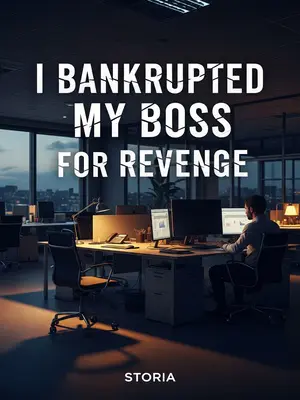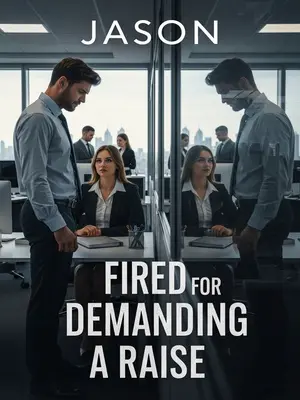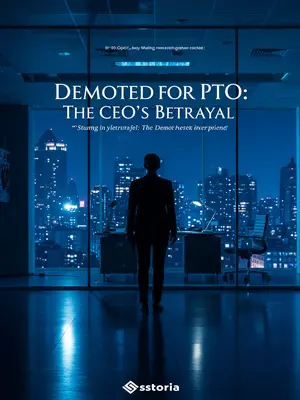Chapter 1: The $1,500 Shockwave
After binge-watching way too many viral videos about grad students scraping by on just $1,500 a month, the boss totally fell for it—and announced a company-wide pay cut. For a second, I thought maybe he was joking, but the way everyone stopped and stared, you could feel the shock ripple through the office. Someone near the copier muttered, "Is this for real?"—but the boss just grinned like he'd discovered fire.
He’d always been the type to swallow whatever he saw online, but this time he’d really lost it. The whole office was buzzing, people exchanging anxious glances and whispering in corners as the news spread. It felt like some kind of bad joke. But the boss? He was dead serious.
Entry-level college grads kept their pay. Anyone with a master’s? Capped at $1,500.
Everyone just about gasped—you could practically hear it echo down the hallway. Folks huddled in the break room, clutching their mugs, trying to wrap their heads around what just happened. I stood there, frozen, my mind spinning. Is this even legal? My phone buzzed nonstop with texts from coworkers—nobody could believe it.
As the only master’s grad in the whole company, I felt like someone had punched me in the gut. I almost laughed at the absurdity, then caught myself. I half-jogged to the boss’s office, mentally rehearsing some grand speech—but honestly, I had no idea what I’d say.
My heart was pounding as I walked down the carpeted hallway. I passed the framed motivational posters—they suddenly felt like a cruel joke. I knocked, barely waited for a reply, and pushed the door open, hoping I wouldn’t just blurt out, "Are you kidding me?"
He didn’t even look up. Just hit me with:
“Didn’t you see what folks online are saying? Grad students are too stuck in student mode. Internships are just paid learning, and $1,500 is generous.”
He sounded almost proud, like he’d unearthed some internet secret and was handing it down like gospel. His desk was a mess of half-empty coffee cups and a pile of printouts from Reddit threads.
“My advice? Don’t stress about the paycheck. The company’s teaching you skills for free. You should be grateful we’re not charging you tuition.” I wanted to snort, but bit my tongue.
He leaned back in his chair, lacing his fingers behind his head like he’d just solved all my problems. I could feel my jaw tightening, but I forced myself to keep my voice steady.
“As for your project bonus, just split it among the senior staff in your department. After all, mentoring you isn’t exactly easy for them.”
Not easy? Please. Every day they dumped all the grunt work on me.
I was the one who pushed the whole project from start to finish—and that’s called mentoring? Ha. Sure.
My mind flashed back to late nights alone in the server room. Pizza boxes stacked by my monitor. The so-called mentors clocked out at five sharp. If this was mentorship, I’d hate to see what actual neglect looked like.
I wasn’t about to put up with it. I filed a complaint with the labor board, got my money, and then—finally—quit. The moment I hit submit on my resignation, a wave of relief washed over me.
It felt good—liberating, even—to finally tell them where to stick it. The woman at the labor board, Ms. Carter, gave me this knowing look, like she’d seen this exact story play out a hundred times before. When the check finally cleared, I celebrated with takeout and a bottle of the cheapest champagne I could find—plastic cork and all, the fizz stinging my nose.
Later, the company’s old clients got poached one after another. The boss finally panicked and tried to lure me back with a "generous" six-figure salary and a long list of empty promises.
It was almost hilarious, getting that desperate email from him—overflowing with flattery, promises of "new opportunities," and a not-so-subtle plea. I almost wanted to frame it. Guess karma really does have a sense of humor.
But what he didn’t know? The boss of the hot new firm stealing his clients was me.
I’ll never forget the look on his face when he found out. Sometimes I replay it in my mind when I need a little pick-me-up. Makes my day every time.
After what felt like the twenty-seventh version of the proposal to a big client, I finally got their approval.
I sat back and let out a long, shaky exhale—the kind that feels like it’s been trapped for weeks. The document on my screen looked like a battle map, redlined and revised to within an inch of its life. But it was done. Victory.
The heavy weight pressing on me for two months finally lifted. I slumped into my chair, savoring the rare relief, feeling every muscle in my back unclench all at once.
My shoulders ached, but I didn’t care. I closed my eyes for a second. Just listened to the hum of the office AC, letting the tension melt away.
Old Marvin from IT strolled by with his coffee mug, the corners of his mouth twitching in a way that made it clear he was about to unleash some trademark sarcasm.
“Young folks these days slack off the minute they get a breather. Hiring people like this? Pure charity.”
He said it loud enough for everyone nearby to hear, like he wanted to make absolutely sure I got the message. His mug read "World's Okayest IT Guy," and I swear he wore it like a badge of honor. I nearly rolled my eyes right out of my head.
Other than me, IT was a retirement home.
I glanced around, just to make sure I hadn’t missed some new hire. Nope—just me, the youngest by at least a decade. Not exactly a youth movement.
I frowned and looked over. Sure enough, Marvin’s eyes were locked right on me, like he was waiting for a reaction.
He didn’t even look away when I met his gaze. Just kept staring, daring me to blink first.
He just smirked, then slurped his coffee, loud and slow, like he was daring me to say something back.
“The boss wants to see you about your pay.”
My ears perked up.
My heart skipped a beat. For a second, I let myself hope—maybe this time, things would be different.
Since I joined, I’d been holding up the whole IT department by myself. If there were medals for keeping the place running, I’d have a whole drawer.
I’d learned the ropes fast, covered for every missing person, and basically kept the whole system running by sheer stubbornness and caffeine. Honestly, if the servers could talk, they’d probably thank me.
All the senior guys dodged work. Claimed they didn’t know how to use the new systems. Or hadn’t learned the latest tech. Meanwhile, I was stuck working overtime every day, doing the jobs of several people at once.
Some nights, I’d be the last one in the building, the only light in the IT bullpen, wondering if anyone even noticed. Usually, they didn’t.
Even so, the boss shot down my raise requests. Said I hadn’t been there long. Didn’t have enough experience. Giving me a raise would upset the old-timers. Same song, different verse.
It was always the same speech: "You have potential, but you need to pay your dues." Meanwhile, the old-timers barely touched a keyboard. Pay dues, huh? More like pay for theirs.
Now he wanted to talk salary—probably because I’d just finished a big project. Given all I’d done, I figured a raise was finally coming. Or at least, I let myself dream for a second.
I got up, excited, and headed to his office, tuning out Marvin’s muttering about how hard he’d worked back in the day, never slacked off, not once. Yeah, sure, Marvin.
I rolled my eyes as I passed him, but I kept my mouth shut. No point in starting another argument with someone who thought the internet ran on fairy dust and wishful thinking.
As soon as I walked in, the boss waved me over. The overhead lights flickered a little, and I caught a whiff of stale air.
He barely glanced up from his laptop, gesturing for me to sit. The room smelled faintly of burnt coffee and air freshener—like someone tried to mask a disaster and failed.
“Alex! Come here.”
He got straight to the point. No preamble, no chitchat.
I braced myself, every muscle tense.
“I want to talk to you about adjusting our company’s pay structure.”
He said it like he was about to announce the next tech revolution. I tried to keep my face blank, but inside I was bracing for impact.
Looking at his eager face, I nodded. I could already feel my optimism slipping away.
He seemed almost giddy, like he’d just solved a puzzle no one else could crack. The kind of look you get when you think you’re about to blow someone’s mind.
The pay system was a mess. No matter how good new employees were, their salaries never budged. No exceptions. Period.
I’d seen it happen over and over: fresh talent comes in, gets ground down, and leaves for greener pastures. The company never learned. Sometimes I wondered if they even cared.
Meanwhile, senior staff who did nothing still got higher pay just because they’d stuck around for years. Some of them couldn’t even remember their passwords.
Seniority trumped skill every time. It was like being stuck in a rerun of a show from the seventies—nothing ever changed, and the jokes weren’t funny anymore.
Because of this, the company could never keep talent. Every capable young person eventually got fed up—lousy pay, constant digs from senior staff—and quit in frustration. It was a revolving door, and everyone knew it.
It was a running joke in the break room—"Survival of the laziest." Sometimes we’d laugh, but it was mostly to keep from crying.
I didn’t know what made the boss suddenly see the light and decide to change things. Probably a viral tweet or some HR memo he actually read for once.
Maybe he’d read a think-piece online, or maybe HR finally got through to him. Either way, I wasn’t complaining—yet.
It sounded like good news for me. Or so I hoped.
I tried not to get my hopes up, but I couldn’t help it. My knee bounced under the table.
Seeing me nod, the boss looked pleased—his eyes crinkled, lips curling into a self-satisfied smile.
He grinned, leaning forward as if we were co-conspirators about to pull off a big heist.
“So you agree to the pay adjustment?”
I was confused. If they were giving me a raise, why ask if I agreed? Was this some kind of test?
My mind raced, trying to see the catch. Was this some kind of trick question? What was I missing?
Who would say no to a raise?
Unless…
A bad feeling crept in. My palms felt clammy.
The air seemed to thicken. I kept my face neutral as a cold buzz crawled up my spine.
Sure enough, the boss smiled and said,
“I’m planning to set your salary at $1,500 starting this month. How’s that sound?”
I stared at him, not sure if I’d heard right. My ears rang. Did he really just say that? I felt my stomach drop.
A grad from a top university, and my salary’s only worth $1,500? Seriously?
I thought about my student loans, my rent, the price of groceries lately. The number sounded like a cruel joke. Like he was daring me to call him out.
Even when I was an intern before graduation, I made more than that. I blinked, trying to process.
I remembered those days—grinding for experience, but at least the paychecks covered my ramen and rent. Now, with a master’s and real responsibilities, I was being offered less. The irony burned.
I forced myself to stay calm. This had to be a negotiation tactic—start low, then throw in some perks so I’d feel grateful. Or maybe he just wanted to see me squirm.
Maybe he wanted me to push back, to feel like I was winning something. I took a deep breath and tried to play along, even though my hands were shaking under the table.
With that in mind, I tested the waters:
“So will my performance review be recalculated? Will the project bonus ratio be bumped up?” I kept my voice light, but my nerves were shot.
I tried to keep my tone casual, but my heart was hammering in my chest. This was my shot. I couldn’t blow it.
He didn’t even pause. Didn’t even blink.
“It’s only because of our platform that you get to work on projects at all. The company isn’t even charging you—that’s already generous. And you still want a bonus?”
He said it like I’d asked for the moon. I could feel my blood pressure spiking. Was he for real?
“But when I joined, the contract clearly said there’d be project bonuses. It’s right there in black and white.”
I pulled up the PDF on my phone, just in case. I’d memorized the section numbers by now. My thumb hovered over the file.
The boss shrugged. “Just split it among the senior staff in IT. They’ve worked hard to mentor you—they deserve a reward.” He sounded almost bored.
He said it with a straight face, as if he really believed it. I almost laughed out loud.
This was too much. I clenched my fists, trying to stay calm, feeling my nails bite into my skin.
I took a slow breath and counted to three before I spoke. I wouldn’t let him see me crack.
“Since I joined, I’ve been the only one in IT working overtime, pushing projects from start to finish. Those guys have done nothing but mock me, and now you’re saying they mentored me? You mean they taught me how to slack off and dodge responsibility?”
My voice came out sharper than I intended, but I didn’t care anymore. I was done playing nice.
The boss looked annoyed. “Alex, how can you talk like that? They’re your seniors—you should respect them! With that attitude, you should be paying us for the privilege.”
He jabbed a finger at his desk, as if that settled the matter. I bit my tongue to keep from blurting out what I really thought. My patience was wearing thin.
I almost laughed, I was so angry. “Then why don’t you take this opportunity? Is the whole IT department just here to bully me?”
I couldn’t help the sarcasm. The absurdity of it all was almost funny—almost. I had to stop myself from rolling my eyes.
He was getting impatient. “It’s not just about you—we’re adjusting pay across the company. All grad students’ salaries are being cut to $1,500.” He waved a hand like he was making some grand gesture.
He said it like it was some kind of noble sacrifice. I wondered if he’d actually looked at the org chart lately. Did he even know who worked here?
I almost burst out laughing. Because of the broken pay system and the way senior staff froze out newcomers, I was now the only master’s grad left in the whole company. Wasn’t this policy just aimed at me? I almost wanted to thank him for the personal touch.
The irony was almost too much. I had to bite the inside of my cheek to keep from grinning. What a joke.
“What about college grads? And the senior staff who barely finished high school?” I pressed. I needed to hear him say it out loud.
He didn’t flinch.
“College grads keep their pay. They’re different from you master’s types—they have real skills.”
He actually said it with a straight face. I wondered if he’d ever seen my resume. Did he even know what I did all day?
“So you’re saying going to grad school means I have no skills?”
To my surprise, he nodded. “That’s what the internet says. Grad students are too stuck in learning mode, too rigid. The first ten years of work are just for training. Not making you pay to work is already generous.”
I stared at him, wondering how someone could be so confident and so wrong at the same time. It was almost impressive.
Seeing my frustration, the boss pulled out his phone, opened TikTok, and scrolled through his favorites, like he was about to drop some ancient wisdom.
He held the phone out like it was a sacred text. I braced myself for whatever nonsense was coming. Here we go.
“Look at these.”
I took the phone and played the first video. I could already feel a headache forming.
“These days, college degrees aren’t worth much. Master’s and PhDs can’t even compete with high schoolers.”
The guy in the video wore a backwards cap and spoke with the certainty of someone who’d never set foot in a hiring office. I almost laughed.
Next video.
“I’ve got a master’s from NYU, working sales in Des Moines, making $1,500 a month, and I’m happy.”
She sounded anything but happy, but I guess the boss missed that part. Selective hearing, I guess.
And another.
“The market for highly educated folks in America is saturated. Paying to work is inevitable.” I snorted. Sure, buddy.
I’d had enough. I turned off the phone and handed it back. Enough TikTok for one lifetime.
I tried not to roll my eyes. If this was his research, I was doomed. Absolutely doomed.
The boss looked smug. “See? Even NYU grads only make $1,500 a month. Are you better than them?” I wanted to ask if he’d watched the whole video.
He leaned back in his chair, arms crossed, waiting for me to admit defeat. Like he’d won some kind of debate.
He waved me off, impatient. Conversation over.
He was done with the conversation. I could tell by the way he glanced at his screen, already thinking about his next meeting. I was just a blip.
“All right, that’s settled. Go back to work. I’ll post the announcement on the company Slack soon.”
He said it like it was a minor memo, nothing to get worked up about. I wanted to scream.
“Boss, isn’t this just taking advantage of honest people?”
I couldn’t help myself. The words slipped out before I could stop them. Oops.
“You? Honest?” He picked up his phone, tapped a few times, and turned the screen toward me with a little flourish.
He looked triumphant, like he’d caught me red-handed. I braced for whatever "evidence" he had.
“Slacking off during work hours, and you call yourself honest?”
I looked closer. The boss had pulled up his Slack DM with Marvin. The latest message was a photo Marvin had just sent of me resting in my chair. Of course.
There I was, eyes closed, head tilted back—caught in the act of taking a single breath after weeks of overtime. The irony was almost too much.
“During work hours, instead of focusing on your tasks, you’re lounging in your chair. Normally, I should dock your pay, but I’m letting it slide. You should be grateful.”
He spoke as if he was doing me a favor, like I owed him something for letting me sit down. As if breathing was a privilege.
I almost laughed.
I clenched my jaw, but forced myself to keep my cool. I’d seen enough of this game. Time to end it.
“I can’t accept this attitude from the company.”
I started, but he cut me off before I could finish. Not that I expected anything else.
Before I could finish, he sneered, eyes cold.
He didn’t even bother to hide his contempt. I could see the conversation was over. His mind was made up.
“Can’t accept it? What right do you have?”
He leaned forward, voice dropping, as if he was about to deliver some profound wisdom. Spoiler: he wasn’t.
“I’ll give you two choices.”
He held up two fingers, ticking them off one by one, like a game show host.
“One, accept the company’s arrangement and go back to work.” I almost snorted.
“Two, you still get $1,500 a month, but after hours you have to go out and bring in business for the company. If you don’t hit the numbers, your pay gets docked.” My jaw dropped. Was this real life?
He looked at me, confident. Like he’d just handed me the keys to the kingdom.
He actually smiled, like he’d just offered me a golden ticket. Delusional.
“I think you know which to choose—unless you’re an idiot.”
He waited, clearly expecting me to fold. I could almost see the smirk forming.
I resisted the urge to punch him, took off my employee badge. My fingers fumbled a little, but I kept my cool.
I set it on his desk, steady enough. This was my line in the sand.
“Then I guess my time with your company ends here.”
I said it quietly, but the words felt heavy—final. No going back now.
He glared at me, eyes boring holes into mine.
His eyes narrowed, jaw tight. I could see the anger simmering beneath the surface. He was not used to being told no.
“What’s that supposed to mean? Are you threatening me?”
His voice rose a notch, but I stayed quiet. Not worth arguing.
I shook my head, slowly, making sure he saw I meant it.
I kept my voice calm, steady. No more games. “Not a threat. We’re just not a fit. A boss who thinks a few TikToks are the truth, coworkers who do nothing but freeze out newcomers—staying here any longer would be a mistake.”
I stood my ground, refusing to look away. The room felt smaller, the air heavy with everything left unsaid. My pulse thundered in my ears.
He slammed the desk. “What do you mean?”
The sound echoed, startling me for a second. But I didn’t flinch. Not this time.
I shrugged. “Just what I said. Starting today, I quit. Please pay my promised salary and bonus in full. From now on, we go our separate ways.”
I kept my tone even, but inside I was shaking. Still, I didn’t back down. Not an inch.
Seeing I was serious, his face darkened. He looked like he’d swallowed a lemon.
He looked at me like I’d just betrayed him. I could see the wheels turning, trying to figure out how to salvage his pride. Too late for that.
“What’s this? Who taught you to throw a tantrum at the slightest dissatisfaction and threaten the company? Are all grad students like this? With that attitude, how could your salary be high?” He practically spat the words.
He tried to sound reasonable, but his voice was tight, brittle around the edges.
He handed my badge back, trying to placate me. Nice try.
He forced a smile, but it didn’t reach his eyes. The mask was slipping.
“How about this, let’s make a new deal.”
He leaned in, lowering his voice as if we were haggling at a flea market. I almost laughed at the theatrics.
“One, I’ll set you a fixed performance target. As long as you hit it, I’ll give you a raise.” I raised an eyebrow, waiting for the catch.
“Two, if you work here for ten years, you’ll be considered senior staff and get the same pay and benefits.” Ten years? I almost choked.
He said it like he was offering me the keys to the kingdom. I wasn’t buying it.
“How’s that? Isn’t the company generous?”
He waited for me to thank him, but I just stared back, unimpressed. Not a chance.
I’ve never liked drama. If the company hadn’t gone too far, I wouldn’t have resigned. Even though the ten-year promise sounded like a joke, I asked anyway, just to see how far he’d go.
I took a slow breath, steadying myself before I spoke. No more games.
“What’s the fixed performance target?”
He thought for a second, glancing around the room.
He tapped his pen against the desk, eyes darting as if picking a number out of thin air. I braced myself for whatever nonsense was coming.
“Let’s say two million. As long as you personally bring in two million in net profit for the company, I’ll give you a raise!” He said it like he was doing me a favor.
He said it like it was perfectly reasonable. I almost laughed out loud. Sure, let me just conjure two million out of thin air.
“The company didn’t even make half a million in net profit last year, and you want me alone to make two million in a year?”
I raised an eyebrow, waiting to see if he’d realize how ridiculous that sounded. Spoiler: he didn’t.
He was unfazed. “You want a raise and special treatment, so you need to make an outstanding contribution. Of course, even if you can’t meet the target, as long as you work here for ten years, the company will take care of you.”
He spoke with the certainty of someone who’d never had to meet a target in his life. It was almost impressive.
I put my badge back on the table, slow and steady.
I nudged it across the wood without a word.
“Such a great opportunity should go to someone else.”
My voice was calm, but inside I felt lighter than I had in months. Like I’d just shrugged off a hundred-pound weight.
His face darkened further. I could almost see the steam coming out of his ears.
He clenched his jaw, nostrils flaring. I could tell he wasn’t used to being told no. This was new territory for him.
“What, getting cocky? There are master’s grads everywhere now. Once you walk out that door, you won’t even find a $1,500-a-month job.”
He spat the words out, as if he could will them into being true. I just stared back.
I ignored his shouting. Not worth my breath.
I didn’t even bother to respond. I’d heard enough empty threats for one day. Time to go.
“Please pay this month’s salary and project bonus on time.”
I made sure to keep my tone polite—no sense giving him any ammunition. I’d learned that much.
With that, I left without looking back. Not even a glance over my shoulder.













